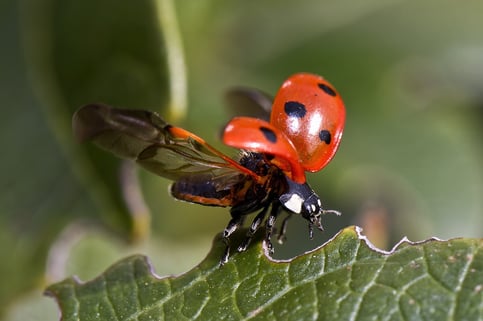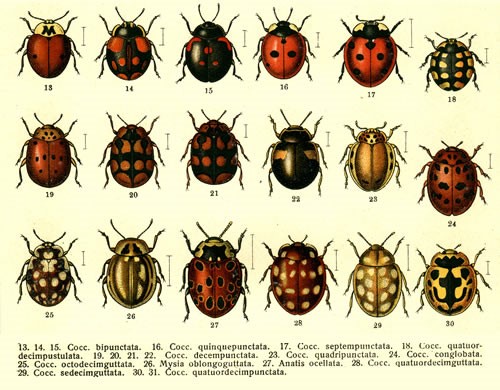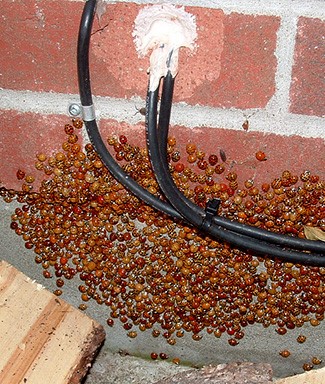How much do you know about these small, red beetles? Cooper explains the most common misconceptions and facts about ladybugs.
Do ladybugs bite?
The short answer is yes. Are they likely to bite? That answer is no. Surprisingly, their small mouths can pack a powerful punch, making their bites painful and sometimes leaving a large red welt if you are unlucky enough to experience a ladybug bite. Ladybugs will not transmit diseases, so their biggest threat to humans is a short lived pain. If you have an allergic reaction to a ladybug bite, please contact your healthcare professional.
Ladybugs are technically omnivores, but mostly predators that prefer to munch on aphids, which are small pests that destroy vegetation and flowering plants that are planted to decorate your garden. They are so effective at eliminating invasive aphid populations that parks such as Victoria Park in Regina, Canada are deploying hundreds of thousands of ladybugs to act as a natural pesticide.
Are ladybugs harmful?

Ladybugs are very beneficial to our environment. They help reduce the aphid populations which aids in the growth of beneficial flowers for pollination. Being an integral part of your garden, ladybugs are important for plant life protection. Ladybugs can be as mutually beneficial to humans as humans to plant vegetation. This is because the ladybugs eat aphids on the vegetation, and humans harvest the vegetation that was able to grow to size. Although most of their actions have positive outcomes, ladybugs can infest your home in large numbers beginning in late fall.
Types of ladybugs
Not all ladybugs are ladies! These spotted beetles are seen as a symbol of good luck and prosper. They originally got their name from Catholic farmers in the Middle ages in Europe who prayed to the Virgin Mary for help to save their crops from disastrous aphids. Their help during this time of need created their image as a symbol of good luck in a world where most people fear insects.
Did you know there are over 450 types of ladybugs in the United States alone and over 4,500 in the world? Most people envision a pretty round, red bug with black spots when they think of a ladybug, but there are much more types of ladybugs with different markings.

Photo Credit: www.ladybug-life-cycle.com
Their unique set of markings transforms what would be an ordinary beetle into a cultural staple and source of fascination. Humans may be attracted to ladybugs, but the natural function of their coloring is to scare away predators with their intimidating hues and patterns that stand out in nature. When a ladybug feels threatened, it will secrete its own distasteful repellent if their markings fail as a warning.
Why do I have ladybugs?
Ladybugs enter homes in the late fall as they are searching for a place to stay warm during the impending cold weather months. They belong to a category called “overwintering pests” which is very suiting to their predictable patterns of activity. An overwintering pest is most literally a pest that stays indoors over the winter. Other overwintering pests include stink bugs, boxelder bugs, and cluster flies.
When large populations of ladybugs enter your home, they can be nearly impossible to remove without professional ladybug service in NJ or professional ladybug service in PA. They secrete a distinct scent that attracts other ladybugs, potentially resulting in an unsightly problem like this:

Photo Credit: www.earthweek.com
Your best offense against ladybugs is a good defense. Sealing up entry points such as small cracks and crevices around the foundation of your home and window and door frames will help prevent them from finding their way indoors.
How can Cooper help my ladybug infestation?
Cooper Pest Solutions offers an Overwintering Service to remove the ladybug infestation in your home. This service also provides coverage for other overwintering pests such as stink bugs, boxelder bugs, and cluster flies. The first treatment takes place in the late summer or early fall before the ladybugs enter. Beginning treatment later in the year is possible upon your request, however, starting our Overwintering Service earlier in the year will ensure you receive the best results. Ladybug prevention focuses on chemical applications to the exterior of the structure and prevents them from taking up residence in your home for the winter.
Call us at 1-800-949-2667 or fill out the form to the right for more information and to schedule service. Bugs are smart. We’re smarter!

